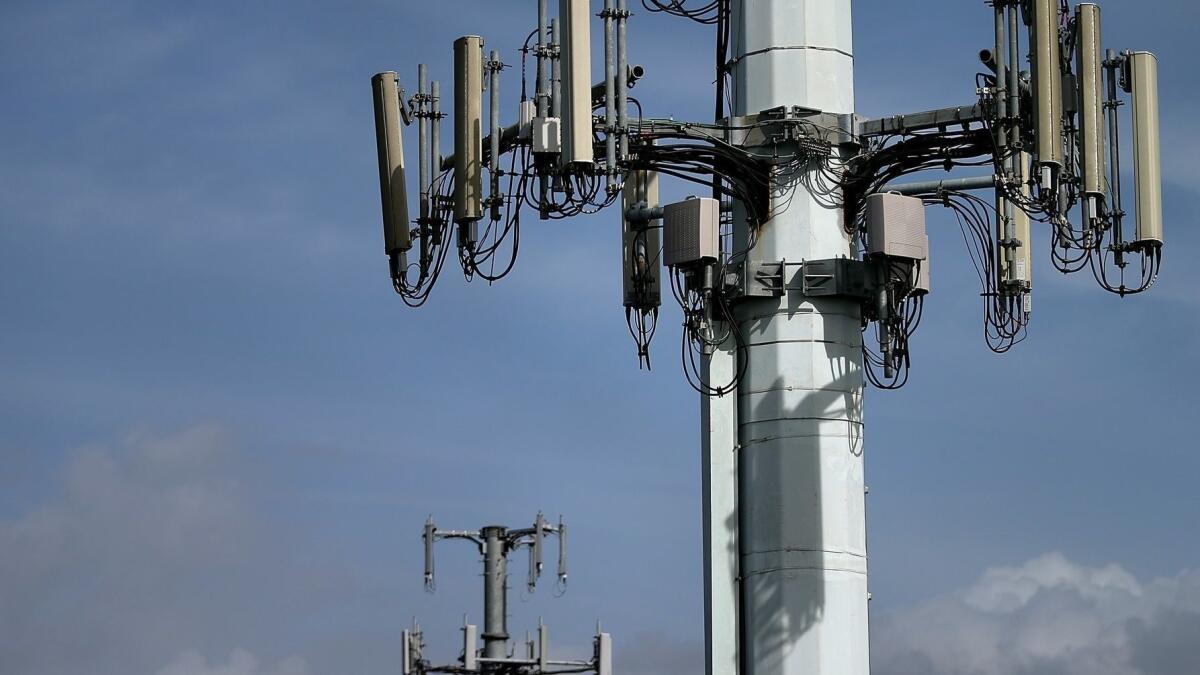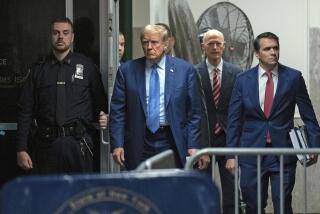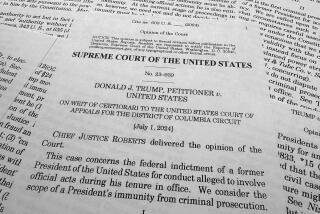Supreme Court ruling updates privacy law for a digital age, saying police need a warrant to get cellphone tracking records

Reporting from Washington â In a victory for privacy in the digital era, the Supreme Court ruled Friday that the Constitution protects tracking data from a cellphone, requiring police to have a search warrant to obtain cell tower records that can show a personâs movement over days or weeks.
The justices, by a 5-4 vote, said the 4th Amendment protects the tracking data, even though these records are collected and held by a private company, not by the individual who is the target of the search.
Privacy advocates hailed the decision as a landmark that updates the law to keep pace with the way modern technology has vastly expanded the amount of data that can be easily compiled and stored.
This nation of 326 million people has 396 million cellphone accounts, Chief Justice John G. Roberts noted, and each of those phones regularly sends signals that record the movement of its often-unwitting user.
The âseismic shifts in technologyâ would permit total surveillance of the public, and âwe decline to grant the state unrestricted accessâ to these databases, Roberts said. He was joined by the courtâs four liberal justices.
The four dissenters, however, warned the court was venturing into new territory by extending privacy rights to information that is not truly private and was not created or held by the user of the cellphone. They also worried the warrant requirement could hamper investigators who are in search of dangerous criminals.
The ruling likely will require changes in the way the FBI and police departments in much of the country handle investigations. The impact will be less in California, however, since the state Legislature in 2015 adopted a law that requires investigators to have a search warrant before they can seek cellphone records.
Last year, police investigators in Los Angeles Sheriffâs Department said the requirement to get a warrant for tracking data had caused them little trouble.
It is not clear how the ruling will affect other disputes over electronic information. Roberts said the decision in Carpenter vs. United States was a ânarrow oneâ that applied only to cellphone tracking data. The dissenters warned the rule inevitably will expand to shield other types of electronic data â a forecast that many privacy advocates hope will prove accurate.
The ruling reflects the high courtâs increasing concern over the vast amount of private information that can be obtained and stored through digital technology â and often without the knowledge of the user.
âThis is a groundbreaking victory for Americansâ privacy rights in the digital age,â said ACLU attorney Nathan Freed Wessler, who argued the case before the court in November.
âThe Supreme Court has given privacy law an update that it has badly needed for many years, finally bringing it in line with the realities of modern life. Todayâs decision rightly recognizes the need to protect the highly sensitive location data from our cellphones, but it also provides a path forward for safeguarding other sensitive digital information in future cases â from our emails, smart home appliances, and technology that is yet to be invented.â
Decision time: Here are some of the Supreme Courtâs recent rulings and whatâs still expected Âť
The case involved Timothy Carpenter, the accused leader of an armed robbery gang in the Detroit area, who was convicted after the jury was told that his movements were tracked for 127 days using data from cell towers. The tracking data showed he was near the scene of several of the robberies.
Under a federal law known as the Stored Communications Act, investigators were able to obtain these records from the phone companies by going before a judge and showing they had facts demonstrating the cellphone records were ârelevant and material to an ongoing criminal investigation.â They were not required to obtain a search warrant based on âprobable causeâ to believe that a particular individual was involved in a crime â a tougher standard to meet.
Police almost certainly would have been able to obtain a warrant in the case because they had ample evidence to show Carpenter was involved in crime.
At his trial, Carpenter sought to have the cell tower data excluded on the grounds it arose from an âunreasonable searchâ in violation of the 4th Amendment.
A federal judge denied the motion, ruling the defendant had âno reasonable expectation of privacy in the cell tower data.â The court of appeals agreed.
For years, courts have held that business records â checks held by a bank, for example, or dialing records held by a phone company â are not private and may be obtained by police investigators without a warrant. The information from cellphone towers was no different, the appeals court ruled.
The Supreme Court disagreed: Carpenter had a reasonable expectation that his movements around Detroit were private, the justices decided. Because of that, inspecting the tracking data was a search, and it was unreasonable without a warrant.
Without such a rule, the government could easily amass too much information, Roberts wrote.
Most people âcompulsively carry cellphones with them all the time. A cellphone faithfully follows its owner beyond public thoroughfares and into private residences, doctorâs offices, political headquarters and other potentially revealing locales,â he said.
âAccordingly, when the government tracks the location of a cellphone it achieves near perfect surveillance, as if it had attached an ankle monitor to the phoneâs user.â
And because carriers keep the location data for an extended period, the records allow the government to look back in time at a suspectâs movements. âWhoever the suspect turns out to be, he has effectively been tailed every moment of every day for five years,â Roberts wrote.
If the government were allowed to freely obtain that data without a warrant, âonly the few without cellphones could escape this tireless and absolute surveillance.â
Roberts said the courtâs rule would not apply during an âongoing emergency, such as an active shooting, a bombing or the abduction of a child.â The 4th Amendment bars searches that are âunreasonable,â and the court has long held that reasonableness means giving police more flexibility in emergencies.
Joining Roberts were Justices Ruth Bader Ginsburg, Stephen G. Breyer, Sonia Sotomayor and Elena Kagan.
The case prompted a sharp and deep divide within the court over how what is meant by an âunreasonable search.â Justices Anthony M. Kennedy, Clarence Thomas, Samuel A. Alito Jr. and Neil M. Gorsuch each wrote a lengthy dissent. In total, the dissents ran to 92 pages, responding to the 23-page majority opinion.
In general, the dissenters said the 4th Amendment only protects private places and private property.
While Gorsuch dissented, he indicated that he might have ruled for Carpenter had his lawyers argued that cellphone records were his property.
The other three saw no possibility of that.
âHere, the government did not search anything over which Carpenter could assert ownership or control,â Kennedy wrote in a rare dissent. âInstead, it issued a court-authorized subpoena to a third party to disclose information it alone owned and controlled.â
Thomas and Alito went further, saying the 4th Amendment should be interpreted to protect only a personâs actual property.
The amendment says people have a right to be secure in âtheir persons, papers and effects,â Thomas noted. By obtaining cellphone records from a company, âthe government did not search Carpenterâs property,â he said.
Alito added, âThere is no plausible ground for maintaining that the information at issue here represents Carpenterâs âpapersâ or âeffects.ââ
Roberts and the majority espoused the broader view, which the high court has upheld for half a century, that the 4th Amendment protects people in their âreasonable expectation of privacy.â
That doctrine dates to 1967 and the case of Charles Katz, a Los Angeles man who regularly placed wagers from a pay phone on Sunset Blvd. The FBI placed a listening device on his regular pay phone, and he was arrested and convicted of illegal wagering.
The Supreme Court reversed his conviction and ruled this wiretapping without a warrant was unconstitutional. The 4th Amendment âprotects people, not places,â the justices said in Katzâs case.
In Fridayâs opinion, Roberts began by citing the 1967 case and declaring âa person does not surrender all 4th Amendment protection by venturing in the public sphere.â No one expects the police will be tracking their every movement for months at a time, he wrote.
The chief justice also cited a famous dissent by Justice Louis Brandeis in 1928. Back then, Brandeis objected when the court ruled that wiretapping did not violate the 4th Amendment because the police had not entered a private home when they listened to private phone calls. Brandeis was right to warn the court to âensure that the âprogress of scienceâ does not erode 4th Amendment protections,â Roberts wrote.
Outside the court, privacy has been one area of law where the libertarian right and progressive left are in agreement, and that has been reflected in some recent rulings.
Six years ago, the high court voted 9-0 to set aside the conviction of a Washington area drug dealer whose daily movements had been tracked by a GPS device that police had secretly attached to his vehicle. Four years ago, the justices ruled unanimously in a San Diego case that the police need a search warrant before they may download the contents of a suspectâs smartphone.
But despite those unanimous votes, the justices had been uncertain about extending privacy rights to business records and other information that customers routinely turn over to others. Carpenterâs case suggests the justices, at least by a narrow majority, have resolved some of that uncertainty.
More stories from David G. Savage Âť
Twitter: DavidGSavage
UPDATES:
3:35 p.m.: This article was updated with additional analysis of the courtâs decision and details of the case.
9:40 a.m.: This article was updated with quotes from the dissents, reaction and additional analysis.
8:15 a.m.: This article was updated with additional quotes from the majorityâs ruling.
This article was originally published at 7:20 a.m.
More to Read
Get the L.A. Times Politics newsletter
Deeply reported insights into legislation, politics and policy from Sacramento, Washington and beyond. In your inbox three times per week.
You may occasionally receive promotional content from the Los Angeles Times.








